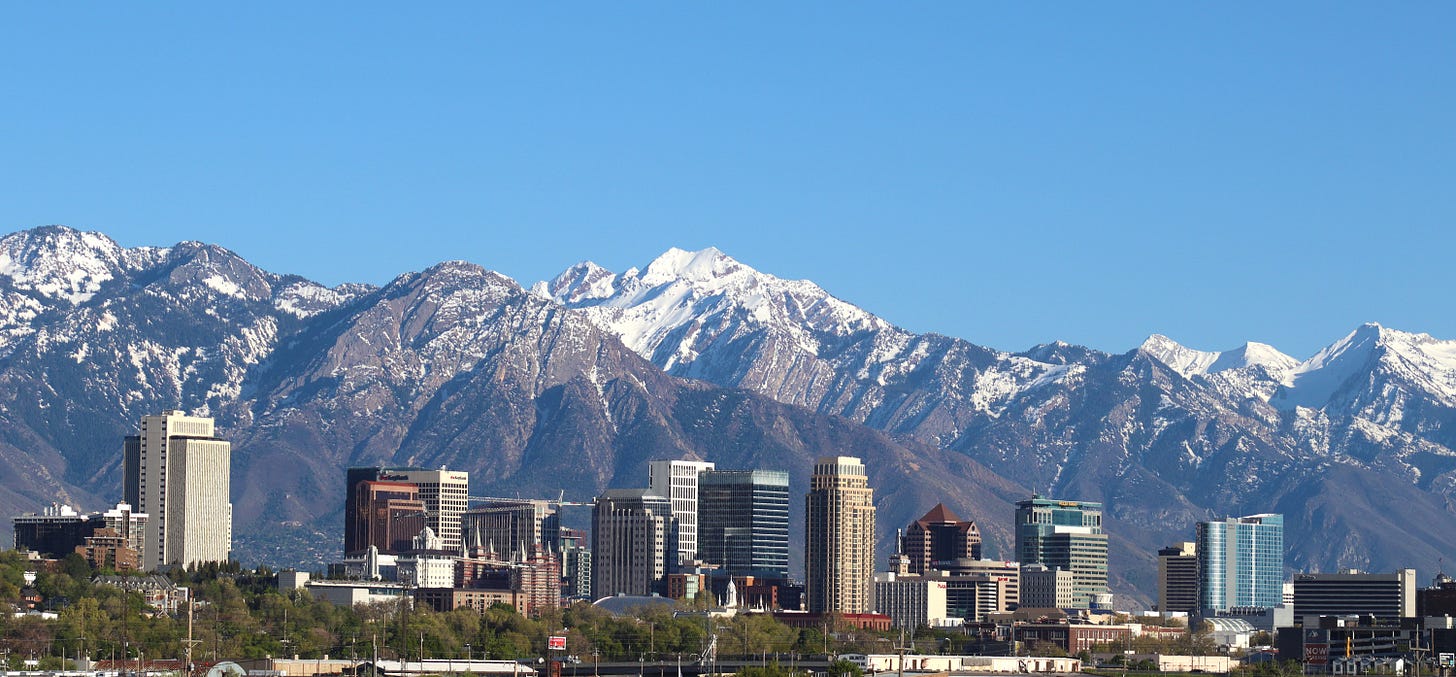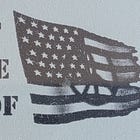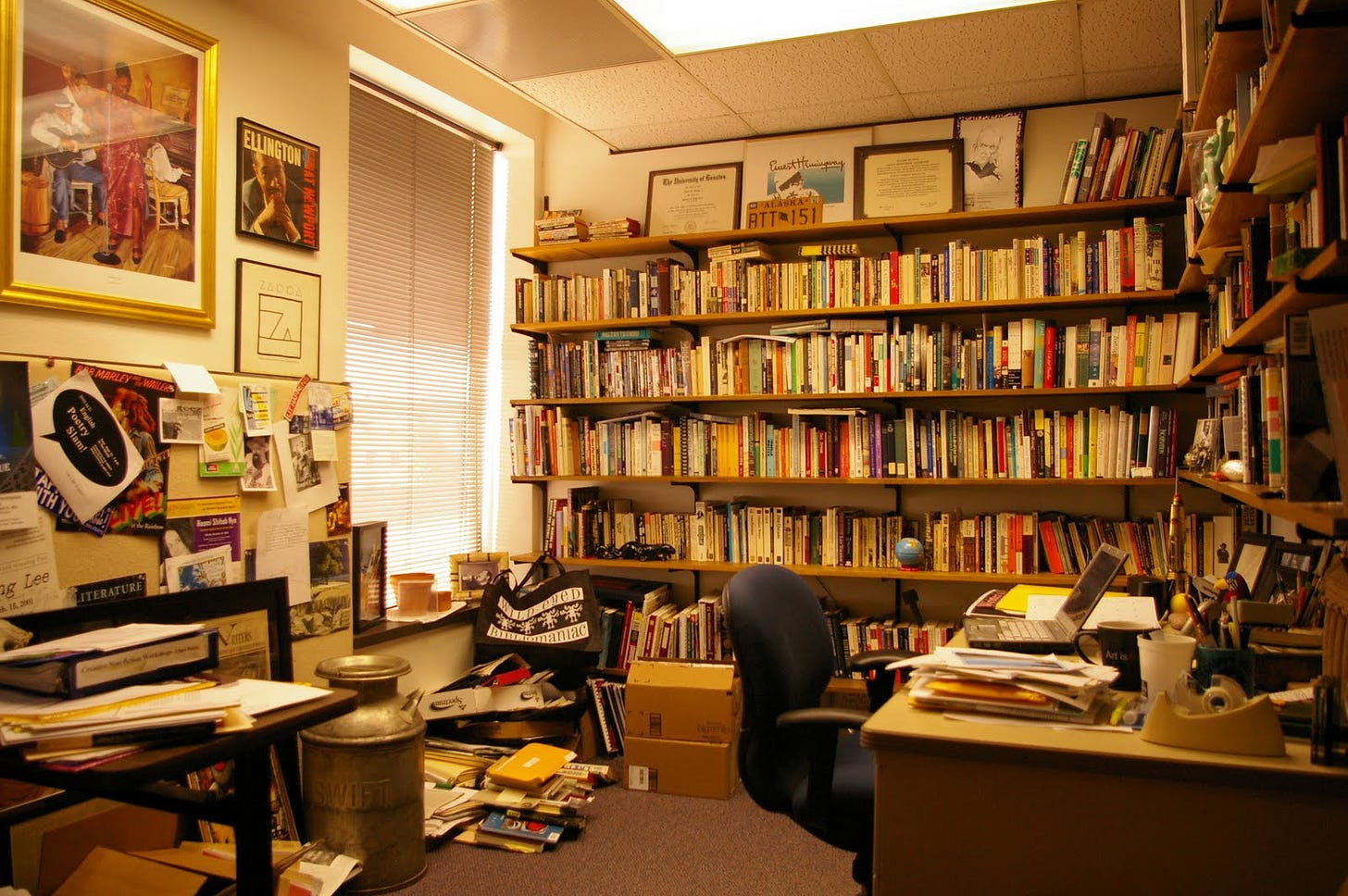What We Were Thinking Of is available for full productions and readings. Interested parties may contact me through my Substack email address.
⇐ Part 4, “People are trying new ways to live”
⇒ Part 6, “You think your life will go a certain way” (July 12, 2025)
Homo Vitruvius and American Samizdat serve as homes for my weekly creative writing and intellectual exploration. HV persists as my original and primary Substack in these pursuits; AS arose in resistance to Trumpism and is dedicated to its defeat. From memoir and poetry to fiction and drama, mostly in HV, to history and political philosophy, predominantly in AS, you will find it here, integrated across the two stacks through a creative and intellectual sensibility I hope you will find invigorating. The stacks may be subscribed jointly or singly in Manage Subscription.
Your likes, comments, shares, and recommendations, and your free and paid subscriptions help gain attention for writing you appreciate and aid the mission to offer a renascent light against the darkness: art, information, culture, and ideas for a free, tolerant, and democratic people. Even the modest monthly subscription rate of $2 gains access to the full archive.
All writing at Homo Vitruvius is free during the week of its publication. It then moves into the paid subscriber archive. At the new monthly subscriber rate, access to the archive costs only $2 per month. Your paid monthly subscriptions and, if you can afford it, your annual subscriptions, are deeply appreciated and help sustain my writing. However, What We Were Thinking Of will be an exception. Access to each installment — to the whole play as it publishes — will remain free for the length of the serialization.
♦︎ ♦︎ ♦︎
Recap last week: David met with his now ex-wife Sara in Chicago’s Grant Park to tell her about the note from Bud. After the two briefly reminisced about their participation in the 1968 Chicago Democratic National Convention protests, we saw all three in 1968 preparing to attend the protests.
This week: David hires a Salt Lake City private investigator, Robert Smith, to find Bud. Back in his university office, David discusses the latest developments and threats to his career with his colleague Kurtis Brown.
(David sits up as Bud leaves. Upstage, Robert Smith appears at his desk, a computer, stack of newspapers, and jar of jellybeans on it.)
SMITH
And what makes you think your friend is here in Salt Lake City, Mr. Rich? He might have mailed the letter passing through. Did he ever spend any time here?
DAVID
We came through here over twenty years ago with some friends.
(getting up, dusting himself)
Other than that ... For all I know he's been living here the past ten years. Though I doubt it.
(David walks to a chair in front of Smith's desk.)
SMITH
Oh? Why is that? Why do you doubt it? Not exactly the Mormon type? You'd be surprised what floats through here these days, Mr. Rich. You'd be surprised. For instance, I'd say you're not exactly the Mormon type either. Yet here you are. Looking for someone.
DAVID
I meant no offense to your great city, Mr. Smith.

SMITH
No. I'm sure you didn't. What did you say your friend's name was again?
DAVID
Powell. Bud Powell.
SMITH
William Powell. Like the actor.
DAVID
Hardly. He's always been known as Bud.
SMITH
The jazz pianist.
DAVID
His father listens to Schubert. He loves Hendrix.
SMITH
They didn’t whistle the same tune?
DAVID
Not much.
SMITH
May I see the envelope?
(David hands him the envelope. Smith reads.)
SMITH
(continuing)
Bud Powell... What's this business about a daughter and sons?
DAVID
I have no idea what the sons part is about. The daughter might refer to my daughter — his daughter.
SMITH
Whose daughter?
DAVID
I adopted her.
SMITH
And the mother?
DAVID
I married her.
SMITH
Bud's wife?
DAVID
They were never married.
SMITH
And this was after he disappeared?
DAVID
After he went to prison. Before he disappeared. After the bombing.
(pause)
Have I shocked you into silence?
SMITH
I'm not easily shocked. I'm just thinking. I do that sometimes.
(Smith starts to rifle through the stack of papers.)
SMITH
(continuing)
You know there was a bombing just yesterday in Atlanta by that serial bomber, the one who calls himself K-9 —
(glancing at David)
You know, the letter and the number --
DAVID
I know who he is.
SMITH
Really?
DAVID
I've heard of him.
SMITH
Interesting name, don't you think? K-9. A dog. But not a dog. Wants to make the world safe for vegetables and trees. And their huggers, I guess.
(Smith tilts the jar of jelly beans in David's direction.)
DAVID
Bad for my teeth.
SMITH
(patting his stomach)
Not good for your weight either. I keep it here to remind me of what keeps me in business.
DAVID
I can't wait to hear the connection.
SMITH
Temptation. Of the flesh. Of fortune. Of the intellect. The last is the least common.
(Smith grabs a handful of jelly beans and turns to the newspapers again.)
SMITH
(continuing)
After the bombing... Bud Powell... I try to keep up with the big city papers. Saves a ton of research.
(Smith finds what he was searching for.)
SMITH
(continuing)
Bud Powell. I thought so. How long since you left Chicago?
DAVID
Two days.
SMITH
Took you that long to pick me out of the book?
DAVID
I do more research than that.
SMITH
I'm sure. I guess I'm complimented. Now let me ask you something. It will seem very elementary to you, no doubt, but it's something I always ask in cases like this. Why do you want to find your friend?
DAVID
(beat, taken aback)
He was my best friend. We grew up together. He did — This horrible thing happened. He went to prison. He disappeared. No one has known if he was alive or dead.
(beat)
And now this note. The tone -- It's very strange. And the comment about my daughter.
SMITH
His daughter.
DAVID
Right. My daughter.
SMITH
You wonder if somehow he wants to make trouble for you.
(David nods reluctantly.)
SMITH
(continuing)
Is there any reason he would want to?
DAVID
I...don't know. I don't think so.
SMITH
But still, somehow, you think he might.
DAVID
Make trouble for me?
SMITH
Want to make trouble for you.
DAVID
Mr. Smith, wouldn't you want to find him if you were in my place?
SMITH
I don't know, Mr. Rich. I'm not in your place. Any other reason you want to find him?
DAVID
Isn't that enough?
SMITH
I just ask. It's interesting how often people don't tell me the real reason they want me to find someone.
DAVID
(beat)
There was something you wanted to tell me about in the paper?
SMITH
This is yesterday's Chicago Tribune.
(On the screen above: RADICAL CONFESSIONS. AS BOMBING'S TWENTIETH ANNIVERSARY APPROACHES, USM RADICAL SHEDS HIS SECRETS.)
SMITH
(continuing, reads from the newspaper)
On February 4, 1971 Bud Powell and
(slows)
unknown accomplices
(beat)
bombed the State University research labs to protest their involvement in Defense Department research. A security guard was killed. At his trial the following year, after thirteen months underground, Powell offered no defense and revealed little of the activities of the University Student Mobilization. Now, in a three-part series in his own words, as the anniversary of that fateful night approaches, Powell gives a complete account of USM'S anti-war activities, the bombing, and its aftermath."
(Smith looks at the stunned David. He hands David the paper for him to read.)
SMITH
(continuing)
You know, Mr. Rich, it's a funny thing after all these years. Sometimes I meet someone over drinks at a party — I'm a pretty rotten Mormon — or I'm on business — I meet a lot of different people in this line of work, as you can imagine — and I'm getting along with him pretty well. And then he says something about himself, about his past, and I stop and I look at him and I think to myself, "Oh. You were one of them." Do you know what I mean?
DAVID
(lowering the paper)
Yes, Mr. Smith. I know exactly what you mean.
(beat)
I wrote a book about it. Will you take the case?
SMITH
I'm a businessman, Mr. Rich.
(points to the newspaper)
And now I have two leads.
(Smith stands and heads off. David remains seated as Kurtis Brown enters. He walks to David and looks for him to get up from his chair. David rises and walks around to sit on the other side.)
KURTIS
Of course everyone's seen it. Our students may not read, Brother Rich, but the faculty does. And they're giving the piece an uncommonly close reading. You're worried, I take it.
DAVID
Of course I'm worried. I know what everyone's thinking.
KURTIS
Many of us knew, of course, but some people were surprised to learn you have a history here at your alma mater.
DAVID
And now people are rightly interested, I suppose -- for all the wrong reasons.
KURTIS
Well, right or wrong, as I say, you have a history here -- at an interesting time, amidst, shall we say, interesting events. So, yes, I think you could say they're interested, for reasons right and wrong.
(Kurtis sits, crossing his legs with a flourish, seeming to preside from the chair.)
KURTIS
(continuing)
My own youthful radical indiscretions are buried in the somewhat more secretive lore of Howard University. I uncover them personally and selectively as needed when it helps to sell my books. And I stopped somewhat short, though I was sorely tempted — I make my Baptist testimony — righteously indignant spawn of the hypocrite South that I was — of bombing buildings. You, on the other hand, have someone excavating in your behalf.
DAVID
But the fact is that all it reveals so far is my friendship with Bud Powell and my work with USM. That's hardly news to anyone who knows me.
KURTIS
Ah, well, everyone doesn't know you. And the operative words are "so far." And now your story is being read — in installments no less — by some of the best readers in the country. The interpretive spades are digging through the dirt — attempting to dig up dirt — in a frenzy.
(George Gray passes.)
GEORGE
Lurking in plain view, David? Not exactly a clandestine return. Very brave.
(noticing Kurtis)
Oh, that you, Kurtis?
KURTIS
No. I'm a ghost. It's a haunting.
(George gives a breathy snort and moves on.)
KURTIS
(continuing)
You should know. He's already asked for the ethics committee to meet. He wants an investigation.
DAVID
Of what? What are they going to investigate? Are they going to find Bud? Ask him what happened?
KURTIS
I understand that's what you've been trying to do.
DAVID
So?
KURTIS
So?
DAVID
Oh, now that looks bad?
KURTIS
Well, you argue for a surface reading of events if you like. But you were best friends with the man. You worked together politically. He suggests there were accomplices. And now here you are trying to find him.
(beat)
George wants you gone. So do the rest of the old and rear guard. You're going to have to stand up.
DAVID
Let them put me on trial? On what grounds? I won't cooperate.
KURTIS
(standing)
David. Why do you think they're going after you? The article? Yes, it's given them opportunity. But they could go after me. Would rather, too. They know I'd fight them. They know I'm a force. You, Brother Rich — forgive me — they see you as a careerist. You talk the talk — your book burned their sorry asses pretty bad — but no one here has ever really seen you do the walk. You seem an easy target. And the war, as someone was good enough recently to remind us, is still being waged — on all fronts.
DAVID
So I have to defend myself, when no defense should be necessary?
KURTIS
Have you read your own book, my brother? Well, now, the war has come to David Rich. Just keep in mind that you have friends here. Good friends. Don't run away from your past.
(Kurtis heads for the door. He turns back.)
KURTIS
(continuing)
I presume they play football in Chevy Chase. Just remember what makes a good defense. And let's have dinner soon. I have some extraordinary new Armagnac to ply you with.
(As he departs Kurtis sticks his hand by his rear to simulate a tail and wags it.)
AJA
⇐ Part 4, “People are trying new ways to live”
⇒ Part 6, “You think your life will go a certain way” (July 12, 2025)
Poet. Storyteller. Dramatist. Essayist. Artificer.









As the play continues, I keep being struck by how au courant it is ( know I said that before) --even though it takes place when the Democratic National Convention brought to it protesters of the Vietnam War. This reader always wants a love interest ... that seems pretty complicated here. Isn't it always?
For me now: I'm feeling as if, in LA, I am living under a president, who doesn't deserve that title and who thinks I am in a war zone.
All your writing, Jay, turns on the keys to the humane, the loving, the brave.
So, I await the finale.
PS: I'm hoping the photo is actually your office. In any case, love it!
I enjoy the humor you inject in the conversations, especially that back-and-forth with the investigator; the exchanges read well and true to character.
I think you also balance well the transitions of scenes between the characters' pasts and their present, and how the latter is beginning to catch up with the former but without anything being given away too soon.
This play, too, is both of its time and for our time. As I read, I can't help but think of the all the events of the '60s and '70s, and specifically the rise of such groups as the SDS and later the Weathermen (Weather Underground) and Black Panthers, how even more radicalized some of those activist groups became as the Vietnam War progressed, how members had to and did go into hiding, then eventually re-emerged, with a few even becoming upstanding academics - Angela Davis comes to mind. What interests me especially is that I cannot think of anyone on the left/far left in America today who is like the young Angela Davis or David Hoffman and calling for change that matters. Why did we have such pronounced (radical?) movements in the play's time period (and during our lives) but not now?